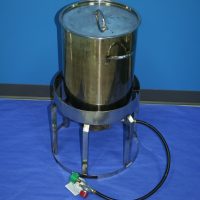As the holiday season nears, thoughts turn to wonderful home-cooked meals with family. Few things in life are more pleasurable than a traditional holiday turkey feast. Yet for an unfortunate few, holiday meal time can turn tragic if a turkey frying accident occurs. While fried turkeys may be tasty, many fire safety experts feel that the reward is not worth the risk. In fact, UL will not list a turkey fryer, even though a product safety standard, ANSI Z21.89 Outdoor Cooking Specialty Gas Appliances, covers the product.
Additionally, the National Fire Protection Association discourages their use. Links to these organizations’ statements on turkey fryers are included at the end of this blog. Consulting those links and watching a few online videos of a turkey fryer catching fire can be insightful, and a bit sobering, if you are thinking of frying a turkey. 
A view of the assembled turkey fryer without a propane supply cylinder.
We have investigated a turkey fryer fire in which a user was badly burned. In that case, the fryer was supplied from the manufacturer with a dial type thermometer to measure the oil temperature when heating the oil. The thermometer that was supplied had no marking as to the maximum oil temperature that should be allowed. Worse still, the thermometer lacked a “needle stop” which keeps the dial pointer from making a greater than 360 degree circuit and giving a deceptively incorrect cool reading.
A thermometer that was supplied with the fryer. It lacks markings of dangerous temperatures and also lacks a needle stop.
In one of our cases, the operator started the unit with the thermometer in place and went inside to prepare the turkey while the oil heated. Returning to the fryer, and noting the thermometer reading, the user thought the oil had not overheated. However, what he didn’t know was the oil was greatly overheated and the thermometer pointer had circled completely around the dial through the high temperature area and back into the cool area. Shortly thereafter, the oil ignited. The user put the lid on the pot and temporarily snuffed out the fire, but in an ensuing effort to move the pot, the lid shifted and the oil reignited. On re-ignition, the pot was dropped. The sudden availability of oxygen to the spilled oil, which was above its autoignition temperature, caused a large fireball that badly burned the user.
A proper thermometer that includes an indication of dangerous temperatures and a needle stop.
Amazingly, in the case we investigated, the fryer came in a carton that showed a photograph of the thermometer that supposedly accompanied the fryer. The packaging photograph showed a thermometer with the proper marking and needle stop, but the thermometer that actually accompanied the fryer lacked those safety provisions. A lawsuit was filed and ultimately settled on a favorable basis for the plaintiff.
As you can see, something as simple as a difference in a dial thermometer can lead a user astray and cause a nasty turkey fryer fire. If you must fry your bird, be sure to use a newer fryer that is listed in compliance with the ANSI Z21.89 standard. Recent versions of the standard require several safety features that are designed to minimize the potential for overheating the oil. Unlisted or older fryers lack these provisions. Additionally, follow all the directions that come with the listed fryer. As for most of us, we’ll stick with roasting our birds in the oven!
For more information on Turkey Fryer Safety:
UL – Turkey Fryer https://www.youtube.com/watch?v=yObDuYTfudY
NFPA – Turkey Fryer https://www.youtube.com/watch?v=kjUynq0HXdQ
Founded in 1997, The Warren Group, forensic engineers and consultants provides technical investigations and analysis of personal injury and property claims as well as expert testimony for insurance adjusters and attorneys. Extremely well versed in the disciplines of mechanical, electrical, chemical, structural, accident reconstruction and fire and explosion investigation, our engineers and consultants are known for delivering the truth — origin, cause, responsibility and cost of an event or claim — with unmistakable clarity.





